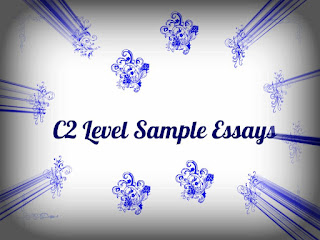In the minds of ESL exam candidates, e ssay writing is one of the most daunting tasks they are required to complete, regardless of the level of the exam, the administering body or the ease with which they themselves use the language. The same applies to students who are asked to write an essay by their teachers at school. In the previous sample essays posted on the blog, the main point I stress is the need to become acquainted with this form of writing (as opposed to writing a letter, review or report, for instance), to get a feel of what authorial voice is and how to organize and progressively express the arguments you wish to make in a coherent manner. Unfortunately, the best way to prepare for exam writing or learn how to write good essays for school is to read as many essays from as many sources as possible, then write as
If you haven't already done so, before you read this sample essay please read
Sample C2 level Essay
The following is a sample essay based on the Examination for the Certificate of Proficiency in English (ECPE) writing section. The question can be found on page 132 of the ECPE Book 1 Practice Examinations textbook published by the Hellenic American Union.
What do I do with the sample writing found on this blog?
Sample C2 level Essay
The following is a sample essay based on the Examination for the Certificate of Proficiency in English (ECPE) writing section. The question can be found on page 132 of the ECPE Book 1 Practice Examinations textbook published by the Hellenic American Union.
The
Internet has brought the entire world to our fingertips. Some people think it
provides us with invaluable access to knowledge. Others think it brings more
problems than it solves. What is your opinion? Give reasons and examples to
support your views.
Advances in technology have undoubtedly aided mankind
in a number of sectors, improving social conditions, health, research and
education. The World Wide Web especially has contributed to the dissemination
of information in such a way that has made printed texts seem archaic. Its
popularity, however, is not an issue many agree on as complaints have arisen as
to the validity of articles found on sites. Nevertheless, it is my firm belief
that the knowledge gained from the internet by far outweighs the dangers which
lurk in cyberspace.
To
begin with, nowhere else is information so readily and directly available as on
the internet. Individuals post pictures or write about events as eye-witnesses and
not as foreign correspondents working for some media magnate who may wish to
present facts from his or her point of view based on vested interests.
Censorship is also not an issue unless a nation has already imposed limitations
on search engines working within its borders, meaning that unadulterated
information reaches readers immediately. Imagine what historic moments such as
the French Revolution would be like if the internet were widespread in the 18th
century, what first-hand accounts posterity would be able to peruse from either
an aristocrat’s or peasant’s point of view. This availability of source texts
and videos is what makes the internet such an enriching experience.
Another
equally compelling argument in favor of the internet as a source of information
is the fact that it is an interactive platform. Not only is there a wide range
of topics on hand to read up on, but the presence of experts who publish
articles or simply create blogs dealing with what they know best also makes
learning easier and the information given legitimate. Forums where questions
are asked and answered are as useful as comment boxes on blogs, where readers
can discuss topics or request further explanations. Videos on the popular
Youtube site containing instructions from baking a cake, to dyeing your hair,
to solving mathematical problems are uploaded making knowledge effortlessly
available and giving viewers a chance to ask uploaders to post new videos on a
different subject. In short, online users receive and ask for information with
a touch of a button.
Nevertheless,
those who state that knowledge found on the web is skewed or that deceptive
sites provide information, when in fact beneath their façade they steal
personal information or spread viruses, are speaking the truth to a certain
extent. Yet, it is the user’s responsibility to see that a tool serves its
purpose and is not used erroneously. In other words, readers must always
analyze the information they assimilate and judge its validity before drawing
conclusions.
All
things considered, though the internet presents many dangers, the limitless
amount of information and knowledge it provides does more good than harm. Were individuals
to use more caution with regard to the sites they visit, install powerful
antivirus software and also weigh opinions and facts more carefully, then those
dangers would be limited to a great extent, allowing people to enjoy the
benefits of this powerful tool.
Word count: approx. 500 words

